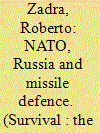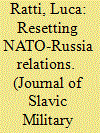|
|
|
Sort Order |
|
|
|
Items / Page
|
|
|
|
|
|
|
| Srl | Item |
| 1 |
ID:
127482


|
|
|
|
|
| Publication |
2013.
|
| Summary/Abstract |
TODAY, nearly forty years after the 1975 Helsinki Final Act, European security remains one of the outstanding issues on the international agenda. The bright post-Cold War hopes that a final and mutually acceptable solution was round the corner proved futile. Very much as before mutual mistrust rules, while the governments preach widely different approaches to continental security. Satisfied with the considerable geostrategic advantages over Russia gained amid the geopolitical shifts on the continent and NATO's eastward expansion, the West sees no reason to change the highly favorable situation and upset the convenient balance of power.
|
|
|
|
|
|
|
|
|
|
|
|
|
|
|
|
| 2 |
ID:
132467


|
|
|
|
|
| Publication |
2014.
|
| Summary/Abstract |
Talks on NATO-Russia missile-defence cooperation were suspended in April during the crisis over Crimea. In retrospect, the window for a real breakthrough had closed some 18 months earlier.
After three and a half years of difficult discussions, the project exploring NATO-Russia missile-defence cooperation is not only suspended, but has probably reached its end. The initiative was an attempt to overcome Cold War thinking and realise the vision of the 2010 NATO-Russia Council Lisbon Summit: a 'true strategic and modernised partnership', and 'a common space of peace, security and stability in the Euro-Atlantic area'.
|
|
|
|
|
|
|
|
|
|
|
|
|
|
|
|
| 3 |
ID:
123221


|
|
|
|
|
| Publication |
2013.
|
| Summary/Abstract |
This article provides an analysis of the 'reset' policy toward Russia, which was inaugurated in 2008 by the Obama administration and soon embraced by the North Atlantic Treaty Organization (NATO). It argues that, rather than being prompted by domestic dynamics in the United States, the 'reset' was a response to systemic pressures. More specifically, the West's relative decline on the international system, the retrenchment of expeditionary NATO, and the rise of potentially revisionist powers. Although prompting an improvement in the relationship, these pressures failed to bring about Russia's full integration into the post-Cold War Western international settlement. In the immediate aftermath of the 2008 Russian-Georgian War, NATO's relations with Moscow experienced an initial revitalization through a resumption of the works of the NATO-Russia Council (NRC), the signing of a New Start Treaty between the United States and Russia in 2010, and an expansion of supply lines to Afghanistan through Russian territory. However, there was no real incentive for both sides to truly 'reset' the relationship. The alliance never treated Russia equally, preferring instead to dictate conditions. Any discussion of Russian-NATO relations was couched in this context; the 'reset' was also conceived as a small gift to Moscow. For its part, the Kremlin never accepted a junior partner status, making it clear that its preferred option remains the alliance's dissolution and the creation of a different, new pan-European organization that would incorporate the Russian Federation as a full member. The article concludes that, despite the mixed achievements of the 'reset', the alliance retains a systemic incentive to seek durable cooperation with Russia.
|
|
|
|
|
|
|
|
|
|
|
|
|
|
|
|
| 4 |
ID:
146810


|
|
|
|
|
| Contents |
Russia and NATO have failed to establish binding institutional arrangements and they are now locked in increasingly dangerous security competition. A closer look at two issue areas where their efforts at binding have failed—NATO enlargement and missile defence—shows that Russia and NATO find themselves facing a ‘catch 22’. They need binding arrangements to overcome the relative gains problems that inhibit security cooperation, yet their concerns about relative gains prevent them from establishing these arrangements in the first place. To overcome this dilemma, NATO and Russia have to craft binding arrangements that seriously address each side’s concerns about relative gains. Less formal and institutionalized binding arrangements may better serve this goal. Such arrangements will not put an immediate end to security competition, but they will help them build a higher level of trust, allowing them to gradually develop deeper and more comprehensive binding arrangements.
|
|
|
|
|
|
|
|
|
|
|
|
|
|
|
|
|
|
|
|
|